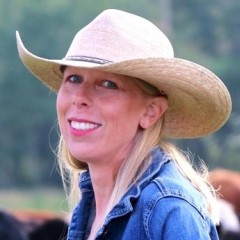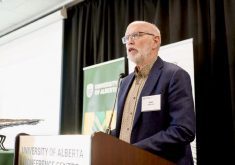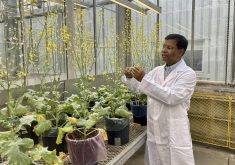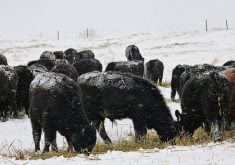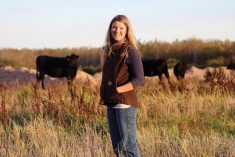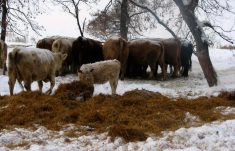The future of forage research is looking bright, and that’s exciting, says one of the country’s newest researchers in this area.
Stacy Singer started work at Ag Canada’s Lethbridge Research and Development Centre just over a year ago and was also one of three scientists chosen for the 2017 edition of a mentorship program created by the Beef Cattle Research Council.
A lack of research funding for forages was a long-standing problem for the sector and Singer found there’s plenty of pent-up demand for innovation.

“Everyone is different in what they want, but I see a lot of interest in the development of varieties that are resilient to environmental stresses,” she said, adding recent droughts have intensified the need for more resilient forages.
Genome editing offers a lot of promise in that, and other, areas, she said.
“I’m a biotechnologist and into the genome editing thing right now, so I’m really excited about the prospect.”
Genome editing has been recently shown to work in alfalfa, and that opens up a lot of doors to what researchers can potentially do with it, she said. It will benefit growers and ranchers giving them what they want, without the GMO stigma, she added.
Read Also

Farming Smarter receives financial boost from Alberta government for potato research
Farming Smarter near Lethbridge got a boost to its research equipment, thanks to the Alberta government’s increase in funding for research associations.
“We’re trying to come up with these new breeding technologies, but they do go hand in hand with conventional breeding.”
Singer is applying this technology to develop new alfalfa varieties.
“I am working on a project right now that involves genome editing,” she said. “We’re trying to develop some new alfalfa varieties that are more stress tolerant.”
But there are many more ideas for projects that she said her and her research team have.
“This is just the very beginning for me.”
The mentorship program paired her with Graeme Finn, a beef producer near Madden, and Gord Card, owner and operator of Sunshine Seeds near Magrath.
“Part of being a scientist is having relationships with people who work with these plants,” she said. “These are the people who really know what the problems are and where we need to improve.”
Both offered that practical viewpoint, but they also discussed out-of-the-box ideas, such as what a dream forage crop would be.
“Some of the ideas have been a bit wild or crazy, but many ideas they come up with are amazing,” she said.
Finn, a transplanted Australian, is well known in the province for his innovative, and enthusiastic, approach to using different types of forages (such as forage-type kales and turnips) and pasture management.
“He has so much energy, he doesn’t limit himself to this is the way it’s always been done,” said Singer. “He likes to try new things all the time. He’s like a scientist at heart.”
The two are still frequently in touch, she added.
“We do have some ideas going now (for future research), and it’s great for me.”
Working with Card brought a different perspective, she said, noting forage research is typically focused on livestock and grazing, not seed production.
“That’s been really good for me, too — to remind me that there’s this other side that we need to consider,” she said.
After earning a PhD, Singer had post-doctoral fellowships at the USDA-ARS Appalachian Fruit Research Station in West Virginia and Cornell University’s New York State Agricultural Experiment Station. Most of her work was on developing biotechnological applications. She then became a research associate at the University of Alberta, focusing on utilizing biotechnology to enhance seed oil content and composition.
The time is ripe for applying biotechnology to forages, she said.
“With other plants a lot of these technologies are already up and running, they’ve already been developed — with forages we’re a bit behind,” she said. “It’s a really exciting topic to be working on.”

